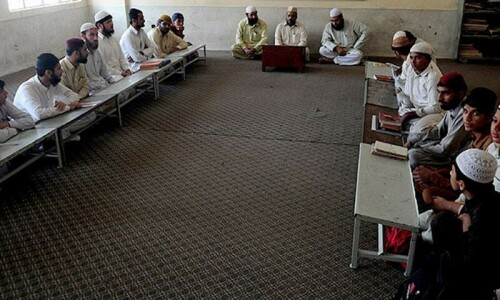ISLAMABAD, March 17: Lack of interest on the part of members and absence of ministers marked the proceedings of the National Assembly during its third parliamentary year.
“There has been negligible change in the overall performance of the 13th National Assembly of Pakistan in its third year and therefore the need for systemic reforms and improvement is as pressing as it was a year ago,” a report released by the Pakistan Institute of Legislative Development and Transparency (Pildat) on the conclusion of the parliamentary year said.As much as 73 per cent of MNAs' questions remained unanswered. Average attendance of members, at 66 per cent, improved by four per cent from the previous year but was eight per cent below the average attendance during the first year.
The house met a dismal three hours per day at an average during 98 days.
Five days were added to budget debate from 10 days in last year, but time consumed in the budget session fell to 39 hours from 42 hours. This year, 161 members participated in budget debate, compared to 170 last year.
The ratio of laws passed to presidential ordinances was 30 to 9, or 3.33 laws for every ordinance, a significant improvement from the second year's ratio of 2.1 ordinances for every law passed by the assembly
Despite declining interest of members and ministers, even pointed out by the chair, it was a sign of maturity that the parties and members upheld parliamentary practices as evident from lack of a rowdy behaviour over the past three years.
The analysis, however, pointed out that looking at the trend in the Punjab Assembly, it was feared that a tit-for-tat approach may be in the offing in the National Assembly.
The report stressed that parliament needed to institutionalise a recruitment and promotion policy of staff through the Federal Public Service Commission and that promotions should be subject to completion of courses at the National School of Public Policy.
Pildat criticised the decision to extend the parliamentary lodges and servant quarters at a huge cost of Rs4 billion when parliament had the option to construct an office block for committees at a lower cost.
Pakistan's parliament, unlike a majority of parliaments even in developing countries, neither provided offices or staff to MNAs nor catered adequately to committees' needs in terms of research staff and committee rooms, it said. Most of the committees cannot hold meetings because of lack of availability of a couple of committee rooms in the parliament building. Bureaucracy often uses this lack of facilities as a tactic to delay or stop a committee meeting from taking place.
Despite trying circumstances where MNAs do not even have access to an office, computer, or research or legislative staff, and innumerable responsibilities relating to constituencies and delivery of services to public, MNAs managed to introduce over 200 private members' bills, nearly 30,000 questions and over 70 reports of the committees in three years.
Pildat praised the Public Accounts Committee for investigating some key embezzlement and corruption scandals.
It observed that despite challenges many committees, especially the committee on house and library that investigated alleged misappropriations in the purchase of land for the National Assembly Employees' Cooperative Housing Society, and the special committee on railways that investigated the 2001 contract allotting 141 acres of railway land to the Royal Palm Golf and Country Club allegedly on nominal prices, managed to carry out objective and authentic investigations and prepared reports many of which had not been presented or discussed in the house. WOMEN MNAS:
Women members accounted for almost half of the parliamentary agenda conducted during the year by the National Assembly, according to records and observation by the Free and Fair Election Network (Fafen) of proceedings between March 11 last year and March 4 this year.
Women constitute 23 per cent of the assembly's current 340 members -- 77 parliamentarians, 60 elected on reserved seats and 17 through popular vote.
Women parliamentarians put up 2,458 parliamentary interventions during the year in the house headed by the country's first woman speaker. Despite the fact that 18 women members failed to participate in any form of parliamentary business and 43 came up with less than 10 interventions, the remaining 34 contributed almost half of the parliamentary business.
There were 10 women parliamentarians who contributed more than 100 interventions each and they can be credited for 60 per cent of the participation of women members and around one-quarter of the parliamentary activity in the house.
All the 10 have been elected on reserved seats and with the exception of one of the PML, all belong to the PML-N. The top performing women members are Shireen Arshad Khan with 176 interventions, Marvi Memon (171), Nuzhat Sadiq (164), Tahira Aurangzeb (161), Qudsia Arshad (155), Nisar Tanveer (154), Khalida Mansoor (131), Tasneem Siddiqui (130), Nighat Parveen Mir (120) and Shaheen Ashfaq (114). More than one-third of the total questions tabled on the floor of the house were put up by them.
The directly elected members contributed eight per cent of the participation registered by all women MNAs, although they constitute 22 per cent of the parliamentary strength of women in the assembly.
During the year, 136 members moved 130 calling attention notices, of whom 37 were women. Women MNAs collaborated with their men colleagues in submitting 108 notices.
Of 3,339 questions raised in the assembly, more than half (1,685) were put by women. On average, 22 questions were submitted by each woman MNA, almost four times more than men.















































Dear visitor, the comments section is undergoing an overhaul and will return soon.